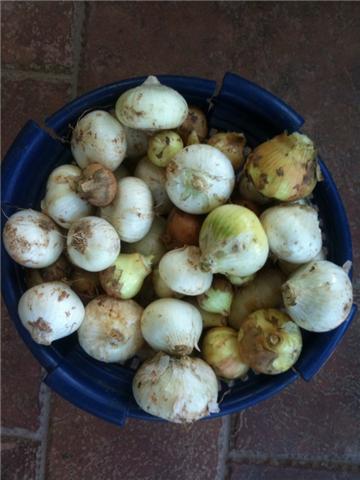
The common onion (Allium cepa) is in the same genus as chives, garlic, and leeks and the same species as shallots. Onion is native to Asia but is grown throughout the world. It is a biennial or perennial usually grown as an annual. The blue-green leaves are narrow, cylindrical, and hallow. The small flowers are white, pink, or purple and produced in globe-shaped umbels. Onions like moist, well-drained soil rich in nutrients and full sun. They are a cool weather crop and can be grown in USDA zones 3-9.
Shakespeare mention the onion five times. One is in reference to fetid breath that results from eating onions but the four others refer to the fact that onions cause the eyes to tear.
In Midsummer Night’s Dream (act iv, sc. 2, 42) Bottom instructs his fellow craftsmen;
And most dear actors, eat no onions nor garlic, for we are to utter sweet breath.
The old French nobleman, Lafeu, in All’s Well that Ends Well (act v, sc. 3, 321) responds to Helena;
Mine eyes smell onions; I shall weep anon:
Good Tom Drum, lend me a handkercher
Enobarbus, Antony’s loyal supporter, in Antony and Cleopatra (act I, sc. 2, 176) replies to Antony;
the tears live in an onion that should water this sorrow.
Later in the same play (Ibid., act iv, sc. 2, 34) Enobarbarus again replies to Antony.
Look, they weep,
And I, an ass, am onion-eyed. For shame,
Transform us not to women.
In Taming of the Shrew (Induction, sc. 1, 124) the unnamed lord instructs his servant;
And if the boy have not a woman’s gift
To rain a shower of commanded tears,
An onion will do well for such a shift,
Which in a napkin being close conveyed
Shall in despite enforce a watery eye.
Onions have been eaten since 5000 BC and were first cultivated about 3500 BC. The Egyptians considered them a symbol of eternal life and used them in burials, and the Israelites ate them when in Egypt. An Indian doctor wrote about their medicinal value in the 6th century BC, the ancient Greek athletes ate them to improve their blood, and Roman gladiators rubbed their bodies with them to firm their muscles. In the Middle Ages onions were a staple of the diet along with cabbage and beans, and they were used as gifts or to pay rents. Shakespeare would have been well acquainted with onions and their many characteristics.
The common name onion is from the French word oignon, bulb, derived from the Latin unio meaning “to unit” or “combine into one” in reference to the fact that only one bulb is produced by onion plants. The generic name, Allium, is the Latin name for garlic; the specific name cepa is the Latin word for onion.